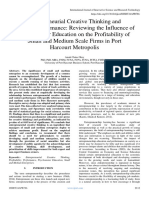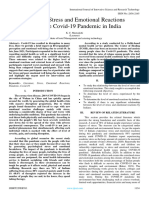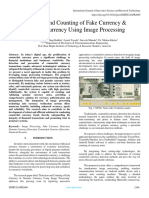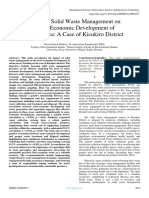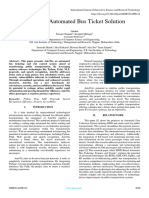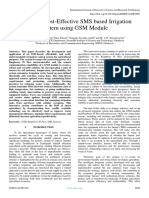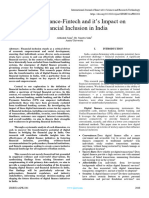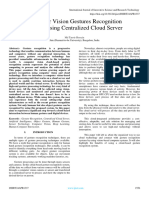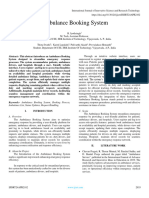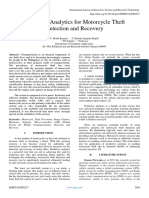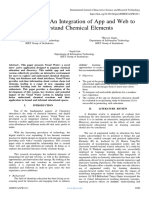Professional Documents
Culture Documents
Human Psychology For Human Development
Original Title
Copyright
Available Formats
Share this document
Did you find this document useful?
Is this content inappropriate?
Report this DocumentCopyright:
Available Formats
Human Psychology For Human Development
Copyright:
Available Formats
Volume 7, Issue 3, March – 2022 International Journal of Innovative Science and Research Technology
ISSN No:-2456-2165
Human Psychology for Human Development
Dr. Sultan Mahmood
Abstract:- In the sphere of social sciences, psychology is interrelationships, social influences, attitudes,
a vital subject. The development of social and perspectives, and pro-social behaviors all have a direct
humanitarian themes is rapidly rising in modern society. impact on social development.
As a result, it is critical to engage the public in a
discussion regarding the value of social sciences and Keywords:- Social Psychology, Social Development, Social
related subjects. The fundamental goal of this research is Factors, Social Sciences, Society
to identify the human psychological factors that
influence human development. Natural sciences and I. INTRODUCTION
social sciences are the two primary categories in the The term "psychology" comes from the Greek word
sciences. Natural science is the study of the natural or "psyche," which means "breath," "soul," and "spirit," and the
physical environment and the conduct of experiments word "logos," which means "discourse" or "study of." It was
based on it. They conduct their research by maintaining the 1980's, and the subject was largely discussed in the
control of the situation within the Science Laboratory modern period of philosophy. Following World War II,
based on the facts. Social sciences, on the other hand, people began to investigate the mind and behavior. They
conduct experiments in society but do not control human stated that psychology is not only the study of the human
behavior. They allow people to act as they wish across mind, but also the study of human conduct. JB Watson was
society, and they simply study the situation and draw the first to propose the theory of human behavior.
conclusions based on human behavior. Sociology and
psychology are combined in human psychology. After a few decades, Sigmund Freud introduced
According to certain social psychologists, anthropology psychoanalysis, which was a theory that explained the
and social psychology are also intertwined. Human human mind and mental processes. Conscious,
psychology studies the growth and pattern of human subconscious, and unconscious processes are used to process
thought and behavior, which is largely impacted by all human activities.
human or social development. Social interaction,
.
Conscious- things we are aware of
Preconscious- things we can be aware of if we think of them
Unconscious- deep hidden reservoir that holds the true “us”. All of our
desires and fears
Psychology is a study that encompasses both social and Association (APA), psychology has approximately sixty
natural sciences. Psychology refers to scientific strategies sub-fields.
for subject growth. Psychology, on the other hand, discussed
both physical and mental aspects of human behavior. As a All of these sub-fields lay the way for the advancement
result, the fields of physiological psychology and of human action, as well as the advancement of society.
neurological psychology have developed, and researchers Social psychology is a study of human behavior from a
are looking at how biological effects affect human social broad perspective. According to Allport (1985), social
behaviors such as family relationships, social interaction, psychology is the scientific study of how the actual,
and social perception. There are a few significant imagined, or suggested presence of others influences
psychosocial approaches that have influenced social people's ideas, feelings, and behaviors. Social psychology
psychology's development. Biological perspectives, was founded in the United States at the turn of the twentieth
cognitive perspectives, behavioral perspectives, evolutionary century. Norman Triplett's experiment on the phenomena of
perspectives and humanistic perspectives are only a few social facilitation in 1898 was the first published study in
examples. According to the American Psychological this field.1 The study of human social relations,
IJISRT22MAR911 www.ijisrt.com 1027
Volume 7, Issue 3, March – 2022 International Journal of Innovative Science and Research Technology
ISSN No:-2456-2165
communities, and societies is known as social psychology. IV. PERCEPTIONS OF OTHERS
Individuals and (members of) social groupings' cognition,
motivation, and behavior are all influenced by personal, The study of how people develop impressions of and
situational, and societal influences.2 Social Psychology also draw conclusions about other people is known as social
investigates how social impact, social perception, and social perception. We learn about other people's sentiments and
interaction affect individual and group behavior. emotions by observing their physical appearance, as well as
their verbal and nonverbal interactions. People communicate
II. SOCIAL PSYCHOLOGICAL CONTEXT FOR without words in a variety of ways, including facial
SOCIAL DEVELOPMENT expressions, tone of voice, hand gestures, and body position.
The cognitive mechanism that assists us in forming
Some major issues in social psychology can be impressions of individuals around us is known as social
interpreted as important variables in social development. perception. Our taught, possibly even subconscious attitudes
Social development can be implemented once human toward other individuals based on any number of their
development is completed. The following are some social distinguishing qualities aid us in comprehending a situation
psychological facts to consider. and determining appropriate behavior. The mental process
Social Persuasion of taking up signs and indications from others that help us
Perceptions of Others establish an early impression of who they are is known as
Cognition in social situations social perception. To develop a picture of what to expect
Relationships with others from any new social contact, our brains may rely on
notion of oneself stereotypes or previous similar encounters.
Attractiveness to others 3
https://www.verywell.com/retrieved from 1/9/16
Attitudes towards others
(Social/Group) Behaviour It now piques the curiosity of a wide range of
1 professionals, including social scientists, psychologists,
Triplett, N. (1898). The dynamogenic factors in
philosophers, and anthropologists, because it incorporates
peacemaking and competition. American Journal of
elements of cognitive processing, individual and
Psychology. 9, 507-533.
interpersonal conduct, group perceptions, and group
2
Hewstone M. Three lessons from social psychology: behavior. Perhaps no more succinctly than the title of one
multiple levels of analysis, methodological pluralism, and anthology of writings on the issue, Person Memory. "The
statistical sophistication. In: McGarty C, Haslam A, work of making sense of ourselves and our behavior
editors. The Message of Social Psychology. Oxford: necessitates that we understand there can be as much value
Blackwell; 1997. pp. 166–181 in the blink of an eye as there can be in months of rational
thought," Malcolm Gladwell concluded after researching the
Aggression in Social Situations utility of social perception. We can also use social
Discrimination and prejudices perception against ourselves by absorbing other people's
Culture impressions of us. The Looking Glass Self is a notion that
analyzes how our sense of self is impacted by how we feel
III. SOCIAL PERSUASION others perceive us.4
Social impact includes peer pressure, conformity, and Social perceptions are created as a result of a
obedience. The ability of organizations in society to combination of experience and expectations about how a
influence change for the betterment of the society or country person's defining physical or other overriding traits will
is critical for social progress. Social influence is defined as a influence how we anticipate that person to be. Ethnicity,
man or woman's inner thoughts, feelings, attitudes, or nationality, religion, class, and disabled people are all
behaviors as a result of interactions with other men or mentioned as instances.
women or a group. Conformity, strength, and authority are
not the same as social influence. Conformity occurs when a V. COGNITION IN SOCIAL SITUATIONS
person presents a specific opinion or action in order to fit
into a specific situation or to meet the expectations of a The way people interpret, analyze, recall, and use
specific person. Social influence, on the other hand, is the knowledge about their social context is referred to as social
process through which people's thoughts and behaviors cognition. The processing, storage, and application of social
change as a result of interacting with others who are information are all part of social cognition. Social cognition
regarded to be similar, desirable, or knowledgeable.... is a theoretical and empirical method to understanding social
Whether or whether a change in reported viewpoint or psychological topics by looking at the cognitive basis of
attitude (conformity) indicated an actual private shift, it was whatever social phenomenon is being investigated. This is to
deemed a case of social influence.3 say, its focus is on an examination of how information is
processed, stored, represented in memory, and finally used
in perceiving and interacting with the social world. Instead
than being a content area within social psychology, social
cognition is a strategy for reading any subject matter area
within social psychology. As a result, a social cognition
viewpoint can be used to investigate a wide range of topics,
IJISRT22MAR911 www.ijisrt.com 1028
Volume 7, Issue 3, March – 2022 International Journal of Innovative Science and Research Technology
ISSN No:-2456-2165
including individual perception, attitudes and mindset you want you could be. In many circumstances, how we
interchange, stereotyping and prejudice, decision-making, view ourselves and how we would like to see ourselves are
the self-idea, social verbal interaction and influence, and incompatible.6
intergroup discrimination.
5
Bracken, B. A. Examiner's Manual for the
VI. RELATIONSHIPS WITH OTHERS Multidimensional Self-esteem Scale. Austin, TX
6
Human behavior, attitudes, feelings, and beliefs are Weiten, W., Dunn, D. S., & Hammer, E.
heavily influenced by social relationships. Social Y. Psychology Applied to Modern Life: Adjustments in the
psychologists investigate at attachment, connection, love, 21st Century. Belmont, CA
attraction, and other aspects of interpersonal interactions to
see how they affect people. The value of interpersonal VIII. ATTRACTIVENESS TO OTHERS
relationships is studied in social psychology, as well as how
close ties effect individuals. One of the most important factors in social
development is social attraction, which is based on the
4
https://www.questia.com/library/psychology/cognitive attitudes of social beings. The evolution of society requires a
-psychology/perception/social-perception/retrieved 1/9/16 national and worldwide degree of attractiveness. Most
cultures strive to become more appealing by promoting
VII. NOTION OF ONESELF social empowerment, welfare, and progress.
Self can be defined as the process by which humans IX. ATTITUDES TOWARDS OTHERS
grow to know and comprehend themselves. According to the
notion of self, it is a study of how self-perception relates to Attitudes are critical determinants of our perceptions
social relationships, as well as how one's inner life affects of, and movements toward, all aspects of our social
one's interactions with others and the social world. As a environment. Attitudes are made up of a complicated web of
result, it raises concerns regarding self-awareness, self- evaluative values, emotions, and proclivity towards specific
esteem, and self-expression, among other things. Self- behaviors. Attitudes are a person's interpretation of herself
concept is divided into two elements, according to the social or others. Our lives are influenced by our attitudes, and
identity theory: personal identity and social identity. human behavior is influenced by our attitudes. It has an
Personal identity encompasses personality traits and other impact on people's perceptions and thoughts about society.
characteristics that distinguish each individual. Our social When it comes to maintaining interpersonal relationships,
identity encompasses the groups to which we belong, such attitudes control other people's actions and attitudes.
as our community, religion, college, and other organizations. Attitudes can also influence collective behavior in a
community.
According to Bracken (1992), there are six distinct
domains related to self-concept:5 X. (SOCIAL/GROUP) BEHAVIOUR
The ability to engage with people is referred to as social. Most people are aware that groups behave differently
Competence is defined as the capacity to meet basic than individuals, according to a social psychological
demands. approach. Social and group behaviors are more
Affect is the awareness of one's own emotional states. advantageous and beneficial. It can be positive, but it can
Feelings about one's attractiveness, health, physical also be detrimental. For example, if a political party decides
to change some policies within the party, a few members
condition, and general appearance
may disagree, resulting in conflict inside the group. On the
Academic performance - whether you succeed or fail in
other hand, when it comes to making decisions for the
school
country's progress, they may agree as a group in Parliament.
Family - how successfully a person functions as part of a Social behavior, also known as prosocial behavior, entails
family unit. assisting and working with the other party or group.
Carl Rogers, a humanist psychologist, believed that
XI. AGGRESSION IN SOCIAL SITUATIONS
self-concept was divided into three parts: How you see
yourself, or your self-image. It's critical to remember that Humans are prone to aggressiveness in society.
one's self-image does not always correspond to reality. Aggression, as a social psychological trait, can cause people
People may have an exaggerated sense of self-worth and to harm themselves or others in society. Human rights
believe they are better than they are. People, on the other violations, gender-based violence, crimes, and social crimes
hand, are more likely to have negative self-images and to are only a few examples.
detect or exaggerate defects or inadequacies. Self-esteem
refers to how well you regard yourself. Self-esteem is
influenced by a variety of factors, including how we
compare ourselves to others and how others react to us. We
are more likely to acquire high self-esteem when people
respond positively to our actions. When we compare
ourselves to others and see where we fall short, it can be
detrimental to our self-esteem. Your ideal self is the person
IJISRT22MAR911 www.ijisrt.com 1029
Volume 7, Issue 3, March – 2022 International Journal of Innovative Science and Research Technology
ISSN No:-2456-2165
XII. DISCRIMINATION AND PREJUDICES XV. CONCLUSION
Prejudices and discrimination can grow at any level of The conclusion of this paper is that the advancement of
society. It is founded on human social structure and social psychology leads to societal advancement. Human
attitudes. Discriminations have an impact on human intra-relationships and inter-relationships are shaped mostly
behavior. People in Sri Lanka, for example, have by social development. Human attitudes and behaviors have
discriminated based on ethnicity or caste throughout the last the power to influence society not just in theory, but in
few decades. practice. Individual behavior in a social setting under
prosocial behavior is the goal of social psychology as a
XIII. CULTURE social science. Social psychology can be defined as a branch
of psychology that studies the nature and causes of human
Social psychologists distinguish between two basic behavior in social circumstances. As a result, it examines
cultural groupings. Individualistic cultures stress individual human conduct as it is influenced by the use of others, as
interests over group interests, whereas collectivistic cultures well as the social context in which this occurs. As a result,
prioritize group interests over individual interests. There are social psychologists study the factors that cause us to behave
a few common features that can be used to define in a certain way in the presence of others, as well as the
individualistic cultures, such as Individual rights are circumstances that lead to positive behavior/movements and
cherished to a middling degree, independence is highly moods. Social psychology is concerned with how emotions,
regarded, and being reliant on others is generally regarded as thoughts, beliefs, intentions, and dreams are formed, as well
disgraceful or embarrassing. People tend to be self- as how such psychological elements influence interpersonal
sufficient. People are considered "accurate" in relationships. The development was mostly centered on the
individualistic societies if they are strong, self-reliant, physical aspects of civilization. On the other hand, Mantel,
forceful, and impartial. In contrast, in collectivist cultures, or human spiritual development, exists in society. Social
traits such as self-sacrifice, dependability, beneficence, and psychological elements have an impact on social
utility to others are valued more highly. Whereas development as a result of human mind growth.
collectivism emphasizes the importance of organization,
social cooperation, independence, and self-sufficiency, REFERENCES
collectivist cultures are more likely to seek help from their
circle of relatives and friends during difficult times, whereas [1.]Triplett, N. (1898). The dynamogenic factors in
individuals living in more individualist cultures are more peacemaking and competition. American Journal of
likely to face problems on their own. Psychology.
[2.]Bracken, B. A. (1992)Examiner's Manual for the
XIV. SOCIAL DEVELOPMENT THROUGH Multidimensional Self-esteem Scale. Austin, TX
SOCIAL PSYCHOLOGY [3.]Weiten, W., Dunn, D. S., & Hammer, E. Y. (2014)
Psychology Applied to Modern Life: Adjustments in the
Development is a multi-dimensional system involving 21st Century. Belmont, CA
the restructuring and reorientation of the entire economic [4.]Allport, F. H. (1924). Response to social stimulation in
and social system, not only an economic phenomena. the group. The Journal of Social Psychology
"Development is a process of improving the quality of all [5.]Allport, F. H. (1942). Methods in the study of collective
human lives with three equally significant features," Todaro action phenomena. The Journal of Social Psychology
(1985)7 writes. Raising people's living standards, such as [6.]Todaro M.P. (1985),Economic Development in the Third
incomes and consumption, levels of food, medical services, World, Longman, UK
and education, through relevant growth processes; Creating [7.]https://www.verywell.com
conditions conducive to the growth of people's self-esteem [8.]https://www.questia.com/library/psychology/cognitive-
through the establishment of social, political, and economic psychology/perception/social-perception
systems and institutions that promote human dignity and
respect; and Increasing people's freedom to choose by
expanding the range of their choice variables, such as
varieties of goods and services in telecommunications. As a
result, according to social psychology, all human actions,
whether direct or indirect, have an impact on social
evolution. Individuals and groups were affected by political,
economic, social, and cultural development, as well as social
influence, social perception, social cognition, interpersonal
relationships, social attraction, social attitudes, social
behavior (social/group), social aggression, prejudices, and
discrimination.
7
Todaro M.P. (1985),Economic Development in the
Third World, Longman, UK
IJISRT22MAR911 www.ijisrt.com 1030
You might also like
- Her Body and Other Parties: StoriesFrom EverandHer Body and Other Parties: StoriesRating: 4 out of 5 stars4/5 (821)
- A Heartbreaking Work Of Staggering Genius: A Memoir Based on a True StoryFrom EverandA Heartbreaking Work Of Staggering Genius: A Memoir Based on a True StoryRating: 3.5 out of 5 stars3.5/5 (231)
- Devil in the Grove: Thurgood Marshall, the Groveland Boys, and the Dawn of a New AmericaFrom EverandDevil in the Grove: Thurgood Marshall, the Groveland Boys, and the Dawn of a New AmericaRating: 4.5 out of 5 stars4.5/5 (266)
- The Sympathizer: A Novel (Pulitzer Prize for Fiction)From EverandThe Sympathizer: A Novel (Pulitzer Prize for Fiction)Rating: 4.5 out of 5 stars4.5/5 (121)
- On Fire: The (Burning) Case for a Green New DealFrom EverandOn Fire: The (Burning) Case for a Green New DealRating: 4 out of 5 stars4/5 (74)
- Team of Rivals: The Political Genius of Abraham LincolnFrom EverandTeam of Rivals: The Political Genius of Abraham LincolnRating: 4.5 out of 5 stars4.5/5 (234)
- The Yellow House: A Memoir (2019 National Book Award Winner)From EverandThe Yellow House: A Memoir (2019 National Book Award Winner)Rating: 4 out of 5 stars4/5 (98)
- The World Is Flat 3.0: A Brief History of the Twenty-first CenturyFrom EverandThe World Is Flat 3.0: A Brief History of the Twenty-first CenturyRating: 3.5 out of 5 stars3.5/5 (2259)
- Hidden Figures: The American Dream and the Untold Story of the Black Women Mathematicians Who Helped Win the Space RaceFrom EverandHidden Figures: The American Dream and the Untold Story of the Black Women Mathematicians Who Helped Win the Space RaceRating: 4 out of 5 stars4/5 (895)
- The Little Book of Hygge: Danish Secrets to Happy LivingFrom EverandThe Little Book of Hygge: Danish Secrets to Happy LivingRating: 3.5 out of 5 stars3.5/5 (400)
- The Unwinding: An Inner History of the New AmericaFrom EverandThe Unwinding: An Inner History of the New AmericaRating: 4 out of 5 stars4/5 (45)
- The Emperor of All Maladies: A Biography of CancerFrom EverandThe Emperor of All Maladies: A Biography of CancerRating: 4.5 out of 5 stars4.5/5 (271)
- Elon Musk: Tesla, SpaceX, and the Quest for a Fantastic FutureFrom EverandElon Musk: Tesla, SpaceX, and the Quest for a Fantastic FutureRating: 4.5 out of 5 stars4.5/5 (474)
- The Subtle Art of Not Giving a F*ck: A Counterintuitive Approach to Living a Good LifeFrom EverandThe Subtle Art of Not Giving a F*ck: A Counterintuitive Approach to Living a Good LifeRating: 4 out of 5 stars4/5 (5795)
- The Hard Thing About Hard Things: Building a Business When There Are No Easy AnswersFrom EverandThe Hard Thing About Hard Things: Building a Business When There Are No Easy AnswersRating: 4.5 out of 5 stars4.5/5 (345)
- Grit: The Power of Passion and PerseveranceFrom EverandGrit: The Power of Passion and PerseveranceRating: 4 out of 5 stars4/5 (588)
- Shoe Dog: A Memoir by the Creator of NikeFrom EverandShoe Dog: A Memoir by the Creator of NikeRating: 4.5 out of 5 stars4.5/5 (537)
- Never Split the Difference: Negotiating As If Your Life Depended On ItFrom EverandNever Split the Difference: Negotiating As If Your Life Depended On ItRating: 4.5 out of 5 stars4.5/5 (838)
- The Gifts of Imperfection: Let Go of Who You Think You're Supposed to Be and Embrace Who You AreFrom EverandThe Gifts of Imperfection: Let Go of Who You Think You're Supposed to Be and Embrace Who You AreRating: 4 out of 5 stars4/5 (1090)
- Osho Dynamic Meditation; Improved Stress Reduction in Farmer Determine by using Serum Cortisol and EEG (A Qualitative Study Review)Document8 pagesOsho Dynamic Meditation; Improved Stress Reduction in Farmer Determine by using Serum Cortisol and EEG (A Qualitative Study Review)International Journal of Innovative Science and Research TechnologyNo ratings yet
- Entrepreneurial Creative Thinking and Venture Performance: Reviewing the Influence of Psychomotor Education on the Profitability of Small and Medium Scale Firms in Port Harcourt MetropolisDocument10 pagesEntrepreneurial Creative Thinking and Venture Performance: Reviewing the Influence of Psychomotor Education on the Profitability of Small and Medium Scale Firms in Port Harcourt MetropolisInternational Journal of Innovative Science and Research TechnologyNo ratings yet
- Impact of Stress and Emotional Reactions due to the Covid-19 Pandemic in IndiaDocument6 pagesImpact of Stress and Emotional Reactions due to the Covid-19 Pandemic in IndiaInternational Journal of Innovative Science and Research TechnologyNo ratings yet
- Influence of Principals’ Promotion of Professional Development of Teachers on Learners’ Academic Performance in Kenya Certificate of Secondary Education in Kisii County, KenyaDocument13 pagesInfluence of Principals’ Promotion of Professional Development of Teachers on Learners’ Academic Performance in Kenya Certificate of Secondary Education in Kisii County, KenyaInternational Journal of Innovative Science and Research Technology100% (1)
- Sustainable Energy Consumption Analysis through Data Driven InsightsDocument16 pagesSustainable Energy Consumption Analysis through Data Driven InsightsInternational Journal of Innovative Science and Research TechnologyNo ratings yet
- Detection and Counting of Fake Currency & Genuine Currency Using Image ProcessingDocument6 pagesDetection and Counting of Fake Currency & Genuine Currency Using Image ProcessingInternational Journal of Innovative Science and Research Technology100% (9)
- Utilization of Waste Heat Emitted by the KilnDocument2 pagesUtilization of Waste Heat Emitted by the KilnInternational Journal of Innovative Science and Research TechnologyNo ratings yet
- Effect of Solid Waste Management on Socio-Economic Development of Urban Area: A Case of Kicukiro DistrictDocument13 pagesEffect of Solid Waste Management on Socio-Economic Development of Urban Area: A Case of Kicukiro DistrictInternational Journal of Innovative Science and Research TechnologyNo ratings yet
- Auto Tix: Automated Bus Ticket SolutionDocument5 pagesAuto Tix: Automated Bus Ticket SolutionInternational Journal of Innovative Science and Research TechnologyNo ratings yet
- Designing Cost-Effective SMS based Irrigation System using GSM ModuleDocument8 pagesDesigning Cost-Effective SMS based Irrigation System using GSM ModuleInternational Journal of Innovative Science and Research TechnologyNo ratings yet
- Smart Health Care SystemDocument8 pagesSmart Health Care SystemInternational Journal of Innovative Science and Research TechnologyNo ratings yet
- An Overview of Lung CancerDocument6 pagesAn Overview of Lung CancerInternational Journal of Innovative Science and Research TechnologyNo ratings yet
- Digital Finance-Fintech and it’s Impact on Financial Inclusion in IndiaDocument10 pagesDigital Finance-Fintech and it’s Impact on Financial Inclusion in IndiaInternational Journal of Innovative Science and Research TechnologyNo ratings yet
- Computer Vision Gestures Recognition System Using Centralized Cloud ServerDocument9 pagesComputer Vision Gestures Recognition System Using Centralized Cloud ServerInternational Journal of Innovative Science and Research TechnologyNo ratings yet
- Ambulance Booking SystemDocument7 pagesAmbulance Booking SystemInternational Journal of Innovative Science and Research TechnologyNo ratings yet
- Unmasking Phishing Threats Through Cutting-Edge Machine LearningDocument8 pagesUnmasking Phishing Threats Through Cutting-Edge Machine LearningInternational Journal of Innovative Science and Research TechnologyNo ratings yet
- Cyber Security Awareness and Educational Outcomes of Grade 4 LearnersDocument33 pagesCyber Security Awareness and Educational Outcomes of Grade 4 LearnersInternational Journal of Innovative Science and Research TechnologyNo ratings yet
- Predictive Analytics for Motorcycle Theft Detection and RecoveryDocument5 pagesPredictive Analytics for Motorcycle Theft Detection and RecoveryInternational Journal of Innovative Science and Research TechnologyNo ratings yet
- Forensic Advantages and Disadvantages of Raman Spectroscopy Methods in Various Banknotes Analysis and The Observed Discordant ResultsDocument12 pagesForensic Advantages and Disadvantages of Raman Spectroscopy Methods in Various Banknotes Analysis and The Observed Discordant ResultsInternational Journal of Innovative Science and Research TechnologyNo ratings yet
- Blockchain Based Decentralized ApplicationDocument7 pagesBlockchain Based Decentralized ApplicationInternational Journal of Innovative Science and Research TechnologyNo ratings yet
- An Industry That Capitalizes Off of Women's Insecurities?Document8 pagesAn Industry That Capitalizes Off of Women's Insecurities?International Journal of Innovative Science and Research TechnologyNo ratings yet
- Study Assessing Viability of Installing 20kw Solar Power For The Electrical & Electronic Engineering Department Rufus Giwa Polytechnic OwoDocument6 pagesStudy Assessing Viability of Installing 20kw Solar Power For The Electrical & Electronic Engineering Department Rufus Giwa Polytechnic OwoInternational Journal of Innovative Science and Research TechnologyNo ratings yet
- Compact and Wearable Ventilator System For Enhanced Patient CareDocument4 pagesCompact and Wearable Ventilator System For Enhanced Patient CareInternational Journal of Innovative Science and Research TechnologyNo ratings yet
- Visual Water: An Integration of App and Web To Understand Chemical ElementsDocument5 pagesVisual Water: An Integration of App and Web To Understand Chemical ElementsInternational Journal of Innovative Science and Research TechnologyNo ratings yet
- Factors Influencing The Use of Improved Maize Seed and Participation in The Seed Demonstration Program by Smallholder Farmers in Kwali Area Council Abuja, NigeriaDocument6 pagesFactors Influencing The Use of Improved Maize Seed and Participation in The Seed Demonstration Program by Smallholder Farmers in Kwali Area Council Abuja, NigeriaInternational Journal of Innovative Science and Research TechnologyNo ratings yet
- Parastomal Hernia: A Case Report, Repaired by Modified Laparascopic Sugarbaker TechniqueDocument2 pagesParastomal Hernia: A Case Report, Repaired by Modified Laparascopic Sugarbaker TechniqueInternational Journal of Innovative Science and Research TechnologyNo ratings yet
- Insights Into Nipah Virus: A Review of Epidemiology, Pathogenesis, and Therapeutic AdvancesDocument8 pagesInsights Into Nipah Virus: A Review of Epidemiology, Pathogenesis, and Therapeutic AdvancesInternational Journal of Innovative Science and Research TechnologyNo ratings yet
- Smart Cities: Boosting Economic Growth Through Innovation and EfficiencyDocument19 pagesSmart Cities: Boosting Economic Growth Through Innovation and EfficiencyInternational Journal of Innovative Science and Research TechnologyNo ratings yet
- Impact of Silver Nanoparticles Infused in Blood in A Stenosed Artery Under The Effect of Magnetic Field Imp. of Silver Nano. Inf. in Blood in A Sten. Art. Under The Eff. of Mag. FieldDocument6 pagesImpact of Silver Nanoparticles Infused in Blood in A Stenosed Artery Under The Effect of Magnetic Field Imp. of Silver Nano. Inf. in Blood in A Sten. Art. Under The Eff. of Mag. FieldInternational Journal of Innovative Science and Research TechnologyNo ratings yet
- Predict The Heart Attack Possibilities Using Machine LearningDocument2 pagesPredict The Heart Attack Possibilities Using Machine LearningInternational Journal of Innovative Science and Research TechnologyNo ratings yet










































